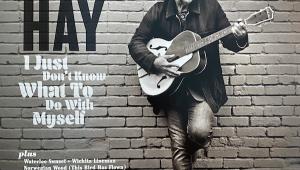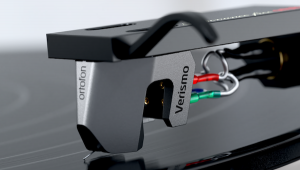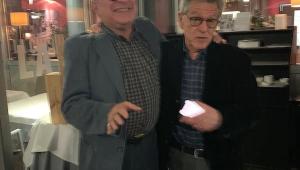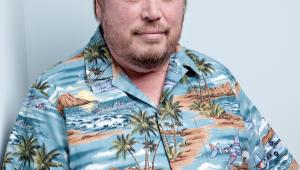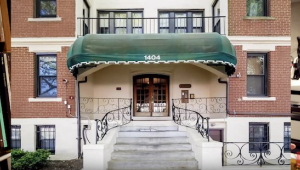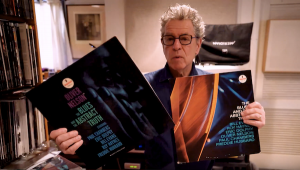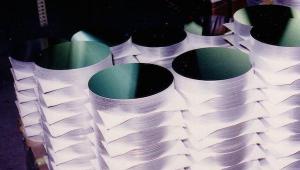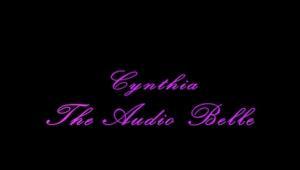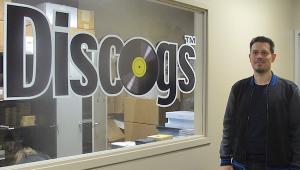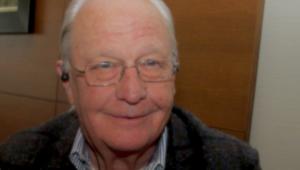Byrds Expert John Nork Interviews Chris Hillman Interview Part 1

John Nork: Let me start back in the past, Chris - how did you get into music?
Chris Hillman: Okay, that's a good question. You know, you'd think I'd get that question all the time, but I never do. I grew up in a home where my parents were not musicians but they had wonderful tastes and there was always music on the record player. Their tastes ran from big-band music, which was their era, and Duke Ellington and Count Basie was what I heard...in fact, one day when I was in my early teens I found an old 78 album of Josh White and I asked my father, "Where did you get this?" And he said, "Oh, I just picked it up at one point." And what's really interesting is that my older sister steered me into music - she went to college in the '50s and she came back from her first year or two in the early '50s, you know, with The Weavers and Pete Seeger and stuff, and I started to listen to that. I bought rock-and-roll records in 1956 and 1957, junior high school. You know, 1957: the year of rock and roll. So, I bought all that, and then, like a lot of people my age, I drifted into folk music. I didn't really get into The Kingston Trio or The Brothers Four; I lasted maybe a week with that, but I really liked the more traditional stuff. I gotta hand it to my older sister. She sort of steered me in that direction and I took it from there. Of course, I wanted to get a guitar and I got an inexpensive guitar and started banging out chords out of a chord book. I didn't take any lessons or anything.
TA: No formal training there?
CH: Not really. And then, as I kept delving into more roots-oriented things, with Leadbelly and The Weavers and Pete Seeger, then I discovered old string-band music - not bluegrass, but old string bands. And then I heard The New Lost City Ramblers and I just fell in love with the mandolin. I just loved that stuff; my peers thought I was crazy.
TA: Speaking of your peers, it must have been weird for someone to get into the strings and bluegrass music unless you lived in an area where that was popular.
CH: It wasn't popular. I was an oddball. The Southern California kids were surfing and listening to that kind of music...some of the older surfers were aware of other types of music. They were sort of listening to that, too, and it was on the fringe of the beatnik era, in the '50s right before the 1960s. Anyway, I did get a guitar and I listened to some stuff, and the minute I heard Flatt and Scruggs I just went crazy. I thought that it was the most fantastic energy of music I'd ever heard. All the old bluegrass greats made me want to learn the mandolin and I started to try to learn off records and I got stumped and at this point I lived 100 miles South of L.A. and I would make trips up to the Ash Grove club (which is just reopening, by the way on the Santa Monica Pier), and the Ash Grove at that time presented these wonderful artists that were appearing at the Newport Folk Festival, from Lightnin' Hopkins to Flatt and Scruggs and I would drive up there to hear them. The end result was I found a guy in Berkeley who could play mandolin and he was playing with the Kentucky Colonels, filling in for Roland White, who was gone in the army, and I took a train up to Berkeley from Delmar, California, about a 500-mile trip. It's interesting, John, I'll point out now that I shouldn't generalize, but we loved the music. All the guys my age that were taking up the guitar, from John Sebastian in New York to Roger McGuinn in Chicago to David Crosby in Santa Barbara, wherever - we loved the music. We didn't have these sort of trappings that were seducing us, like limousines or money. We just had this obsession with playing the music. There it was. To do this day, I kept wanting to go back to college, but something always happened and now I'm 51 years old. What good would it do? That's it. I've been pursuing that, and I've had my ups and downs over the years, but I can't complain.
TA: What would you have done if you hadn't been a musician?
CH: I have no idea. I really don't. I had such a tragedy happen when I was 16; my father died. We were very, very strapped financially and I went to work and went to night school. I don't know what I would have chosen. There was a lot of things I liked, but I really never thought about it.
TA: Let me ask you one more thing about this era, Chris: what made you pick the mandolin over the banjo or any other of the instruments?
CH: I really loved the sound of it. Once again, I guess it fit me. At that point, my personality was very high and energetic and the sound that instrument made attracted me.
TA: How did you get from picking up and learning the mandolin and making your commute to Berkeley to actually getting into bluegrass groups that recorded, such as the Hillmans and the other early bluegrass groups?
CH: I hooked up with some of these kids in San Diego and that was about all. There was one fellow I played with in high school, but I had hooked up with these guys and we played around California and we made a record and it was one of those super-market records at the time. The type you could buy for 79 cents in those days. The Hillmans were really The Golden State Boys. The Golden State Boys were a group that was appearing on weekly local TV out of LA, and there was a show called "Cal's Corral," which was put on by Cal Worthington, the car dealer. He had live music. It was a very exciting time for a lot of these types of shows in LA in the late '50s and early '60s. "Town Hall Party" and "Cal's Corral" and all these showed basically live country music at night. The Golden State Boys were one of those acts. Ironically, I used to watch them when I was in high school, and I ended up playing with them for a few months. We got a situation where we made a record. It's very interesting how it all weaves into the same pattern: we met a guy named Jim Dickson who recorded us, and he convinced us to change our name to The Hillmans, God knows why. These guys were really bluegrass guys -
TA: Seasoned pros.
CH: They were really my window on authenticity. They were from the South and they had moved out to California to work, but they were real guys. We made this record and we played coffeehouses and things like that. We actually played country-western bars and I had to get a fake ID. You know, I met a lot of people back in those days. I met McGuinn, and Crosby later on, and as it turns out, that lasted a little while. But the thing that I was saying earlier about weaving the pattern is that Jim Dickson ended up running into McGuinn and Crosby and Gene Clark as they were trying to start a rock band patterned after The Beatles, and when David was going to be the bass player and he didn't want to do that, and Jim asked me and it all worked itself out.
TA: How did you get from being somebody, basically a young student studying the mandolin, to getting on to even a locally produced TV show?
CH: It was a lot of luck that I practiced really hard and played a lot and The Golden State Boys had done a festival together, a big bluegrass festival at this club called the Icehouse, in Pasadena, and I met Don out there, so he saw me play and when they needed a mandolin player, he thought of me and called me and I was up in San Francisco, trying to get a job and I got his telegram and went down and hooked up with them.
TA: I'm sure part of it was your skill on mandolin, but there probably weren't a ton of mandolin players around?
CH: I'm sure there were some around who were a few hundred times better than me - I was really in the intermediate period of playing.
TA: Were you interested at this point in changing from bluegrass to rock, or was it just that you ran into Dickson?
CH: I loved The Beatles. I thought they were really special when they came out and Jim invited me down to hear the guys singing and I thought that they were really great. It was above and beyond anything I'd ever heard before, and I thought, "What an opportunity!" when they asked me.
TA: How did you feel about the bass part of it at that time?
CH: Well, that was a brand new thing for me, as the other instruments were for the other guys. Everybody came from a folk music background. We all literally learned how to play together. This really made for that interesting Byrds-sound we came up with. A lot around Roger's playing, of course, but we weren't a garage rock-and-roll band. We were a bunch of kids that came out of folk music, so to speak, and we plugged it. It was interesting - I never really tackled the bass as a bass player. In some instances I would do other things, but I think Paul McCartney was a big influence.
TA: And again, with the bass, you were also totally self-taught? You can really hear, as you play the four CDs sequentially, the evolution of your bass work. Not that it was ever not good, but....
CH: No, no, John - there were some points where it wasn't good. I felt there were moments later on in The Byrds where I reached a point where I was beginning to sound real musical. In Younger Than Yesterday and a couple of the later albums, I was really having a good time and learning how to play it better.
TA: You did some amazing bass work, especially on that album. But you could hear it evolving. Some wonderful stuff. It's one of the aspects of The Byrds' music that can really be called unique. No one else around at that time had that style. It's funny, nowadays you read interviews - I'm sure you've seen them - with contemporary bassists, and many of them cite you as a major influence.
CH: It's really very flattering. I never looked at myself as being a great bassist. Great bass players are Lee Sklar or Emory Gordy, or Jerry Sheif - these three guys are phenomenal bass players. There are lot of 'em out there: John Patatucci is phenomenal. But, hey, that's great. It's been 30 years.
TA: Now Chris, in the original group, you didn't sing, correct?
CH: I didn't sing until Gene left the band.
TA: Okay, but you did sing in the bluegrass groups you were in, right?
CH: Yeah. Not a lot, though. I was pretty shy. A pretty shy guy - I probably could have but I was just too nervous about it.
TA: And you may have felt that they already had three guys who could sing?
CH: Well, they had, in The Hillmans, three great singers. They were phenomenal singers.
TA: And you mentioned also crossing paths with The Kentucky Colonels. Does that mean that you knew Clarence White way back in the old days?
CH: I knew Clarence from the age of 16; we were both the same age.
TA: He was a pretty remarkable guitarist himself. It's just a real tragedy that he passed on before his time.
CH: He was fabulous. Yeah, of all things, a silly thing like that...but he was a great musician.
TA: I'm going to get back into this later, about how you brought some of those guys back in for Younger Than Yesterday, but I don't want to get out of my question order. So, you met Dickson and he got you involved with the others. Did you guys have a specific plan for The Byrds, or was it kind of like you would see what happened with it and take it from there?
CH: I think one thing Dickson did do was steer us into more of a little more emphasis on material and depth and substance. On "Tambourine Man" he had access to people - he knew Dylan at that point, and songs like that. And Gene and Roger were writing and wrote some great stuff. I think we sort of really were just going through this stage of trying to be real Beatlesque. Gene was writing some interesting songs. In fact, listening to those four CDs, I did listen to all of them, and I just went, "What a great song writer he was." At that age he was writing things like, "The World Turns All Around" - just gorgeous songs. He was the best songwriter in the band at that point in time. It went on, of course; unfortunately he was just fighting demons all his life...but what a writer he was. My God! It wasn't that he was well-read or anything, it was just that he had this sixth-sense about things. The rest of us struggled to come up with stuff like that, and he could pull it out of his head.
TA: Some of the early records are just really beautiful. Some of it has just held up so well, even today.
CH: The one great thing they put on one of the CDs was "It Won't be Wrong" or something from the first album, and I turned to my wife, I said, "My God, there's my video." You know, I remember standing on stage at Zero's on Sunset Strip, playing that song, and the level of excitement going on when we'd hear a bunch of kids and just lock into this groove and this whole five-piece band....
TA: That was one of the things I was going to ask you about, Chris. The original Byrds as a studio versus a live band - what are your feelings?
CH: I'll tell you, we were better in the studio. We were our own worst enemies as far as presenting a stage show, but there were moments when we shined. We had a week-long engagement at this club called The Trip, on Sunset Strip, and Paul Butterfield was the opening act and let me tell you, the original Paul Butterfield Band was just killer. Amazing. Mike Bloomfield - amazing. And, here's an interesting bill: The Paul Butterfield Band and The Byrds. The Byrds were an established rock-star band and we rose to the occasion. We played good. Just because we had to! And we got up there and we sang good and we played good and we held our own. There wasn't any competition in that sense. So, there were moments...there were other times when it was a disaster.
TA: What would you attribute that to? Just being young?
CH: Young and lazy, and undisciplined. And when we stopped listening to Dickson - Dickson wasn't always right, but most of the time he had a pretty good overall view of what we should do - and when we stopped listening to him, it sort of fell apart. As it did when Brian Epstein died, it sort of lost the man at the rudder, and that happens.
TA: When he first brought "Tambourine Man" to your attention, what did you think about that as a piece of material?
CH: I wasn't smart enough at the time to see exactly how good that song was. I was just the bass player, and I went, "Oh, blah blah blah," and all, but it's a wonderful song. Then, it was a great song and it was a great bit of foresight to do that. McGuinn sang it great. You know, it's funny, I listen to the cut of it, which is the one or two we never played on (or the B-side), but I said, "I wonder what it would've sounded like if we had played on it," but it's very slick and Roger adds this real good vocal to this very slick track. The only thing I miss is The Byrds' essence, this really rough edge that we had.
TA: Do you have any strong feelings about analog versus digital?
CH: Actually, I do. I prefer analog. What, are they putting vinyl out again? I don't know why they do that. But everything I've been doing in the last couple years has been on analog.
TA: Well, I know that the old stuff [Hillman's early post-Byrds recordings] was digital ...
CH: Jerry Rhodes' stuff was, the last things I did this year were analog. You know what, John? There's not a lot of great records, of great songs anymore. The other day, I heard a great song: "Georgia," by Ray Charles, on the radio. Let's figure out when that was cut - what kind of equipment did they use? To hear him sing that and play that...my God, it gives you chills. That's what music's about, not piling track upon track upon track, and this and that. What does that mean? That doesn't do anything! I don't get it as much anymore. You'll hear a Beatles song, and it's “Oh, my God,” with John Lennon singing, and it's so great.
TA: Did you notice when you played the CDs - Bob Irwin, by the way, did a great job - the remix of "Tambourine Man?" That's the first time I'd ever heard it in stereo.
CH: There's things I'd never heard before. I'd forgotten we'd put an organ on the song "5D" - by the way, [that's] one of the greatest songs Roger McGuinn has ever written. He'd probably never admit that. That's one of the best songs - I love that song. It just swings like a big pendulum. And the other thing, I'm throwing these at you and you can assemble them later, but Michael Clarke got so much bad press as a drummer, and he was an undisciplined drummer, but there were moments when he zapped. You know, "Eight Miles High," he was wonderful. A lot of songs, he was great on. I listened to them and I just went, "God."
TA: Even though it's a little off-rhythm at some parts, "I Know You Rider" had a great drum part. And, really when you think about it, people talk about the harmonies and the 12-string, which certainly are the most immediately dominant parts of the Byrds, but Crosby's rhythm guitar and Clarke's drumming ...
CH: David plays great rhythm.
TA: A really distinctive style.
CH: Everyone added something different. There was no pattern. Nobody went by the normal rule book of how you're supposed to play this particular beat. We did it because we didn't know how. It's like search and destroy. That's what made it great. This is another thing I don't hear any more -- that uniqueness in music when people took chances and did things differently.
TA: It's too bad, too.
CH: You know, and I hear groups that I really like, and I hear things that I really like, and I think Sting is real good. I think his music is real interesting. That was the best part of The Byrds was that we were all jumping over together and landing where we did. We did what we could do and it was real musical.
TA: It was very experimental. The vocal part of the group, all the harmonies and the quality of the vocals, was that something that was carefully rehearsed and planned?
CH: David came from a whole other places with his harmony parts. He obviously listened to the Four Freshmen and things like that, as did I guess Brian Wilson, but David did harmony parts that I wasn't really used to. I was coming from the old Southern gospel, straight third part of harmony, and David was doing these really interesting things.
TA: It was really almost jazz-oriented.
CH: Exactly. Nobody in The Byrds really shared a common musical background, if you think about it. Everybody came from a different place, musically.
TA: Any particular tracks on Mr. Tambourine Man you can recall that you either like or don't like?
CH: "Here Without You." There's an interesting song with Mike Clarke. There's Mike Clarke doing something that's very interesting.
TA: The cymbals, you mean?
CH: Yeah. Doo, badadada, doo. It's like a jazz 6/8 waltz type.
TA: I always felt "Feel A Whole Lot Better" would have made a great single. I mean, a lot of people have done it over the years ...
CH: Wasn't it a single?
TA: I think it was on the flipside of "All I Really Wanna Do."
CH: You know the story, John, of "All I Really Wanna Do." We were playing Zero's when we just started to hit, and Sonny and Cher were in the audience, in the front row. I saw them sitting there, I think they were called Caesar and Cleopatra. They were studying us, and then, of course, they came out with "All I Really Wanna Do." They did a pretty good job on it. They did it a little more towards the way Dylan wrote it.
TA: What was "You and Me" going to be? That's one of the bonus tracks.
CH: I can't remember. I played it once, about a month ago, but I don't know what the heck that was. But, "You Don't Have to Cry" is a great tune. Crosby hits that harmony, it's so simple. And there's Gene ... did Gene write that?
TA: Yes, he did, with McGuinn. When you play the older version, the little extra 12-string licks that McGuinn did on the final version, track 4, really add a lot to the song. It's nice.
CH: What's nice is my kids have the CD of our greatest hits, and my son was playing that all the time. I had to tell him to stop. But, at least he liked it! And he was picking out the good songs.
TA: A budding musician, maybe.
CH: Let's hope not.
TA: Let me move on to Turn, Turn, Turn!. Any particular comments on that one?
CH: "It Won't be Wrong," of course. At the time, I did not appreciate it when we did it. I thought it was kinda dull, and then, I listened to the lyrics, and I thought: what great lyrics. Maybe we didn't cut it right, maybe we didn't give Gene the musical support he needed to really showcase that music.
TA: Yeah, the lead vocal he did on that was beautiful.
CH: I think we did a real weak track to his great lyric. "Lay Down Your Weary Tune:" eccch, it doesn't knock me out. "He Was a Friend of Mine" is pretty good. I'll be honest with you -- I like the way we recut it a lot. I think it's a better song, with the three-part harmony. It was more decent, especially with Roger, when we were older and able to understand the lyric better. I think the box set cut is really good. "The World Turns All Around Her" is great. "Satisfied Mind:" ecch.
TA: Were you the one who brought that in?
CH: I sort of brought that in, but it didn't come out the way it should have. I think we were all used to Hamilton Camp's version, on his solo, folk album. We should have listened to Porter Waggoner. That had a real, better thing on it. The last bunch of songs ... well, there's a couple of killer songs on this record and a bunch of stuff that was quickly recorded without a lot of though put into it.
TA: Was that because of deadline pressures you had?
CH: Yeah, I remember Jim Dickson did not want us to do "Turn, Turn, Turn." He said that that would be our last number one single, and it was. I don't know why, because the song is more known throughout the world for The Byrds, more than "Tambourine Man."
TA: Yeah, it is.
CH: Especially with the Forrest Gump thing. It's really gotten a lot of mileage. "It Won't Be Wrong" is a pretty good tune. That was going to be the single. That's a great song. "She Don't Care About Time" I've always loved.
TA: Do you have any thoughts about the alternate arrangement of "The Times They Are A-Changin'?"
CH: I think we shouldn't have bothered with that song.
TA: You guys tried for a long time with that one, huh?
CH: I think so. It just didn't do much for me.
TA: Do you recall the recording sessions for "Turn, Turn, Turn?"
CH: It took a lot of takes, but remember that we were in a union room, and these guys ... this was the era when engineers wore white shirts and ties, and they'd take union breaks. As soon as you were ready to do another take, it would be their break time and they would take a half hour break.
TA: How about "Oh Susanna?"
CH: A waste of tape. I mean, it really was. I can safely say that. Why? What does that mean? It meant nothing. But, I could sit here and nit-pick everything I've done. I can always find something. You go, "Why'd I do that?" But this one -- a waste of time. It was a situation where we were under pressure and rushed. Every guy that you would talk to, there's only three of us left, but they would have a different take on this. We remember different things. Everyone you shared an experience with would remember different things. I remember Roger was putting his little book together, and he was saying, "What happened in South Africa?" And I'd tell him things, and he wouldn't remember that. He would tell me things, and I would say, "I don't remember doing that."
TA: On these first couple records, obviously you guys were really young, and you had a giant blast of fame come and strike you, were there a lot of internal tensions?
CH: I think around Turn… we were probably having some problems. We were all strong, creative people. I'm sure the ingredients were there for us to react. Every other group, every other act -- what, two survived? The Beach Boys and the Rolling Stones. The Rolling Stones just deal with it as straight business. They get together when they want to do something, and the Beach Boys are all candidates for extensive therapy.
TA: Clearly not musically motivated in their case, either.
CH: Yeah, that's just the normal. My great analogy is: five guys, and everybody has a paintbrush and we're all trying to paint the Mona Lisa. And, it comes out a little differently and tempers flare.
TA: I understand. The first two albums are what's called your "folk-rock era." With the 12-string and a certain sound, the harmonies and all. Was there a conscious decision at the time of 5D to change that, to get away from that sound, or was it more of a natural evolution?
CH: I would say a little of both, but moreso involving the evolving. The state of affairs with the Byrds and having been out on the road, and playing after a year or so. "8 Miles High," of course, we'd been listening to John Coltrane and we'd been on a Dick Clark rock and roll tour, and we constantly had music on our RV. We were between John Coltrane and Ravi Shankar at that point. In fact, we did 5D after that particular road trip, and we took that left turn. We didn't sit down and say, "let's do this." It just happened. "8 Miles High" was about that trip to England, and Gene once again comes up with this great imagery -- exactly to the point, of when you touch down, blah blah blah, describing London and the summer. It was cloudy, we were tired, it was just a very interesting end result of that tour.
TA: Let me ask you about Gene Clark's departure. The official story was that it was fear of airplanes, but I don't know.
CH: Well, he was under a lot of pressure. That was just part of it, I think. I don't think he liked flying, but that was part of it. There was a lot of pressure, and he wasn't happy and I think there was some dissension among the other principal singers at the time, and it just got to him. He had problems before that, it just ... he was a great guy. Here's this very nice kid from Kansas, but I think Hollywood, of all the cliched things, just ate him up and spit him out. I think Gene probably would have had a really good life in the Midwest. But, I don't know. He was just a tortured guy, from the getgo. It's too bad. He left, and then I tried singing.
TA: Did you guys consider, at any point, bringing in an other person?
CH: I don't remember. It's possible, but it just didn't work that way.
TA: You didn't sing at all on the first two records. I'm sure you didn't want to see Gene go, but were you glad to have the opportunity to do the singing?
CH: It was nice to be out in the front and do that, and it was also hard to do it for a while, but it was good. The door opened and I sort of took advantage of it. I didn't take advantage until the next record, you know, after "5D."
TA: That's my other question: I don't hear your voice very much on 5D.
CH: I wasn't really singing much, other than doubling Roger. See, what Gene did was double Roger, there wasn't really a three, distinct tenor-baritone lead, there was just two leads and David. It was interesting because the voice that came out of Roger and Gene was interesting. But, that's basically it. They didn't do the same parts; I don't know why. Because when we went in to do the box set, we did three-part on "He Was A Friend of Mine" and everything else.
TA: There were a few tracks: "Lay Down Your Weary Tune" was three-part, I think "It Won't be Wrong" was.
CH: I think I'm on "Lay Down Your Weary Tune." I think in the blend, there.
TA: Your right though, it's two guys and Crosby, which gave him more room to do more with the intervals, chromatically, which was really nice.
TA: You mentioned that you prefer, presently, analog to digital recording. What is it you like better about the analog?
CH: It's live, it sounds real, it's not as sterile sounding. I can feel the heartbeat -- that's the best way to put it.
TA: It is a good way to put it.
CH: You can feel the heartbeat of the player, or something. That covers everything.
TA: I should ask you, for all the bass players that may read the magazine, what you used for your bass guitar and your amp back in the good ol' days, and what you presently use.
CH: Well, in the good ol' days, I used a Fender bassman, and or a Fender dual showman with JBL speakers. I usually play the precision bass. On the Byrds box set I was using a Rickenbacker, and I ended up using a GNL bass. Now, I don't have an amplifier. I do not own an amplifier at all.
TA: Amazing!
CH: I use a tiny practice amp, but I don't play electric guitar. Everything I do is acoustic. In fact, I even have an acoustic Martin bass. If I was going to play electric bass again, I would probably try to find an electric Precision bass. I do have a Rickenbacker I'm using right now that I own. It was made for me. If I was going to go out and play again, I think there's a couple things on my mind right now as far as bass rigs. I think that smaller is better right now.
TA: Did you guys use the Fender stuff in the old days because of the contracts between CBS and Fender or was that just coincidental?
CH: They didn't buy Fender out until after we'd been established. Then, we got the Fender stuff as kind of an endorsement, and then there was all that suspect stuff they were doing in the late sixties. But, that was the best stuff then. I like the tube sound, anyway. On guitar and/or bass. It goes right along with the analog.
TA: Yes, it does.
CH: You can check the equation, you can make it letter perfect and it becomes surgically perfect and sterile, and in that search for perfection, you just hate yourself in the end. You've erased any emotion, and that's what it does. It's like you'll see a lot of these wonderful guitar players out there -- they have a rack of gear. Then, you'll see James Burton or Steve Cropper or Clapton or somebody playing out of an old amp. All that tries to do is to duplicate that sound they're getting. It's really interesting.
TA: Yeah, it is.
CH: There's another thing out, you might want to research it, but it's a device that can duplicate any sound on the guitar. I don't know if it's Roland, or whoever makes it, but it's interesting because a friend of mine has a guitar and he was showing it to me, and I said, "Yeah?" And he says "Here's the Hendrix sound. Here's Keith Richards." Perfect. A perfect duplication. I said, "That's great. But how does anybody develop their own sound?" If you're going to dial in all these established things that these guys came up with on their own, hook and crook, you know.
TA: It's kind of a musical photocopying machine. It just replicates but can't create.
CH: It's interesting. It'll come back, you know -- it already is; it's rolling back from square one, back to analog and the tube sound. Just simplifying it and experimenting and finding a sound and being unique and being different. Everybody starts out sort of having heroes, and we all try to emulate them.
TA: But you have to go off on your own way, hopefully.
CH: I never had the patience to learn things off of records, thankfully. I couldn't do it -- I would just get the essence of it. I tell young players now to get the essence of it, don't copy. Do it yourself.
- Log in or register to post comments


